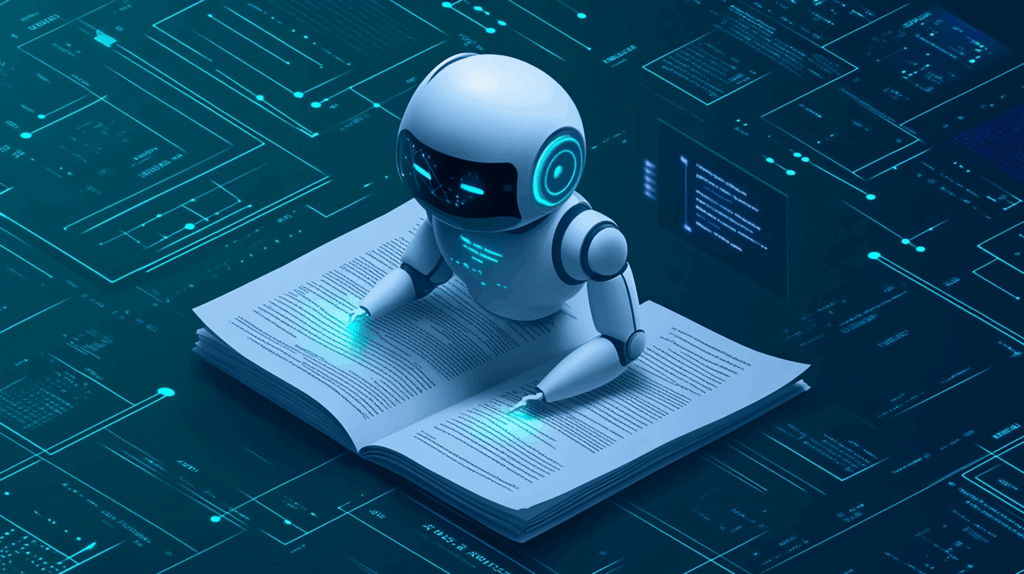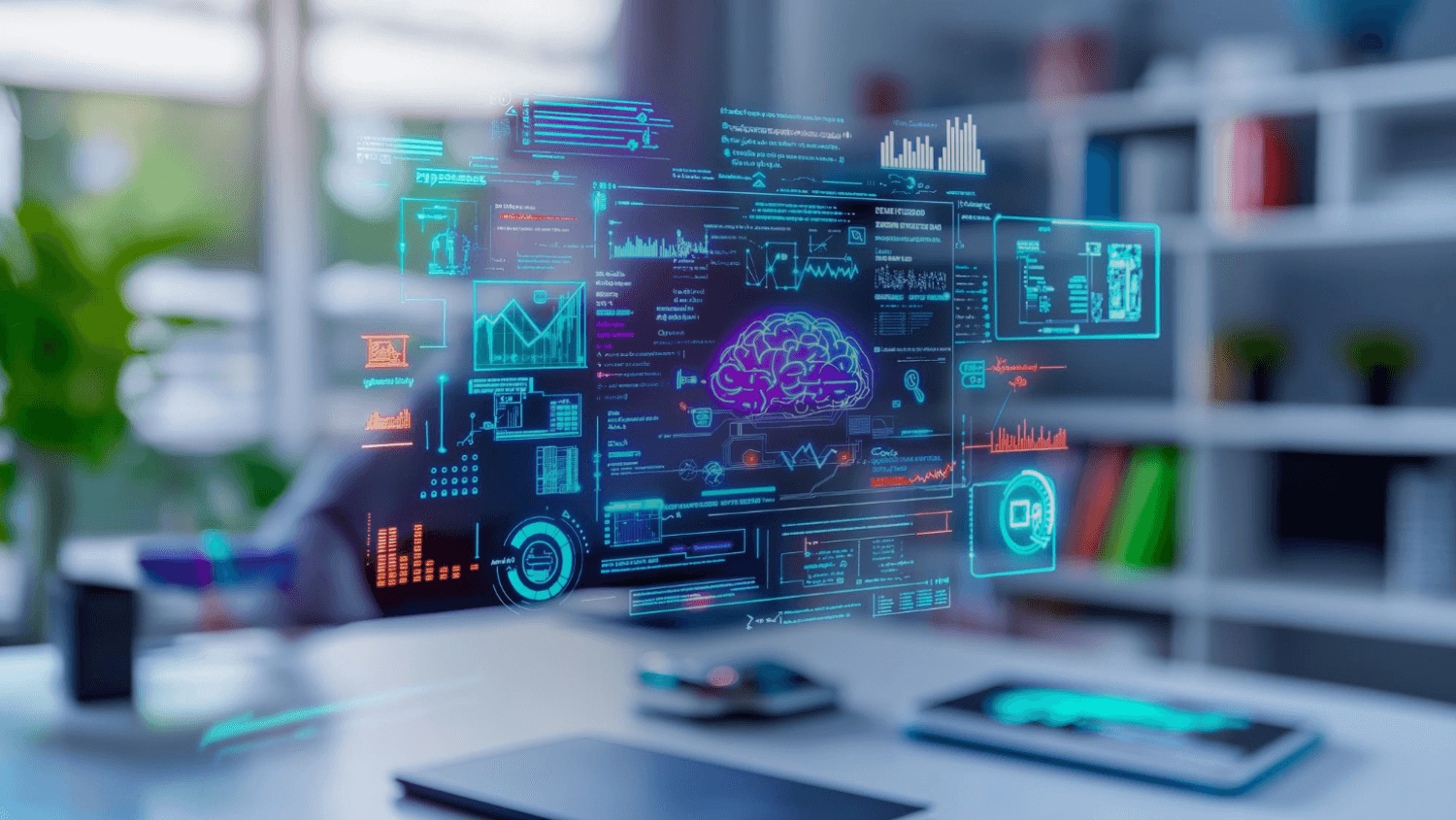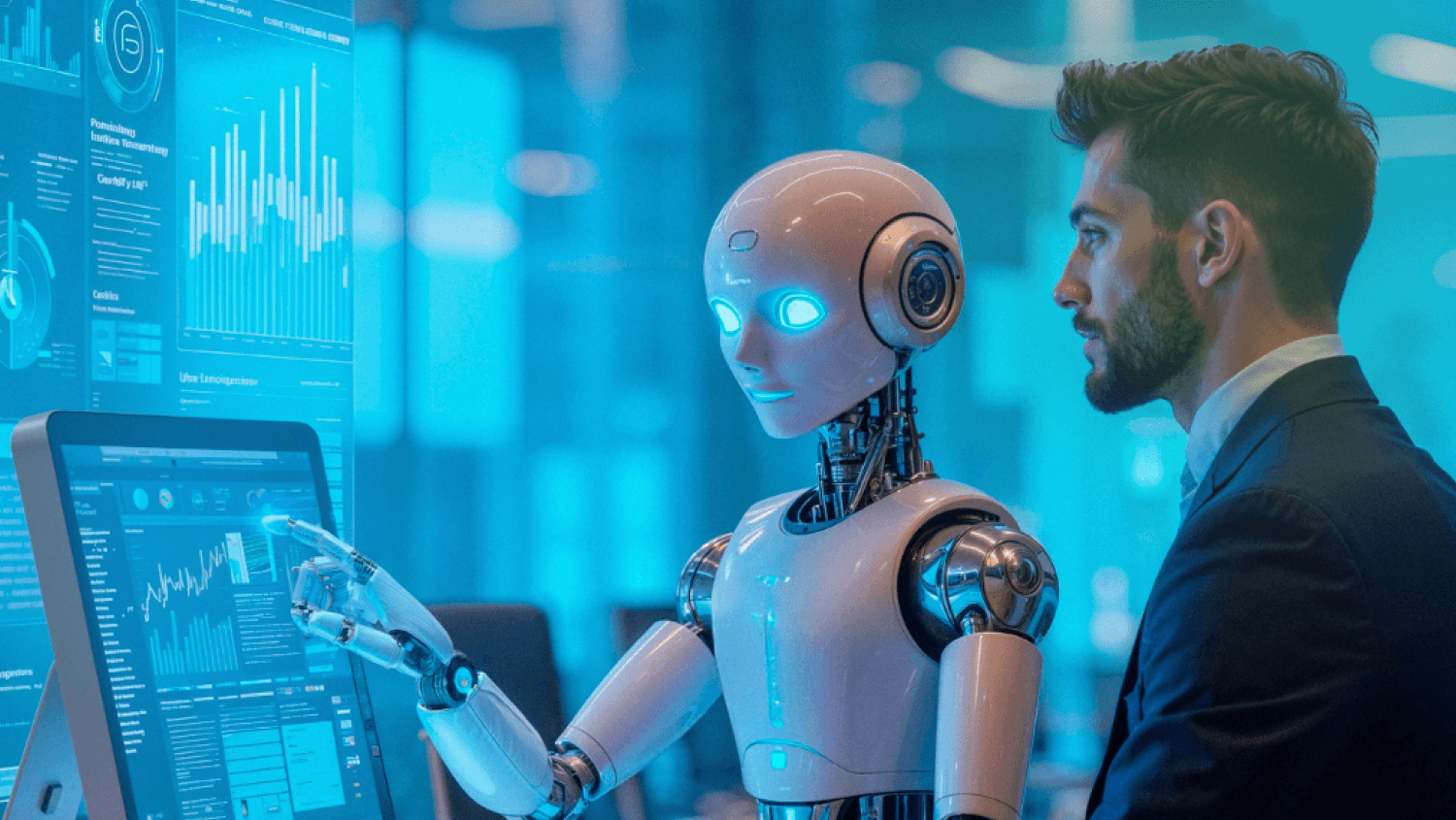AI agents are no longer just experimental tools in the lab, they’re becoming indispensable assets in the research ecosystem. According to PwC, two-thirds (66%) of organisations that have adopted AI agents are already seeing measurable value, particularly in the form of increased productivity. Furthermore, 73% believe that the way they implement AI agents over the next 12 months will provide a significant competitive edge, while 75% express strong confidence in their company’s AI agent strategy.
In research domains, where time, accuracy, and reproducibility are paramount, AI agents offer a transformative move. From automating literature reviews to generating testable hypotheses and simulating experimental outcomes, these intelligent systems help researchers work faster, think broader, and scale smarter.
In this blog, we explore how AI agents are being applied across scientific functions, the benefits they deliver, and how researchers can begin building their own agentic workflows.
What Are AI Agents in Research?
AI agents in research are autonomous, goal-driven systems designed to assist or carry out tasks traditionally performed by scientists. Unlike traditional automation, which follows predefined rules, these agents can understand complex data, make decisions, and continuously learn from feedback. They don’t just execute tasks, they reason, plan, and act with intent.
AI research agents are built on agentic workflows, where each agent has a specific role in the scientific process, working independently or collaboratively to accelerate outcomes. Here’s a breakdown of the types of agents transforming research today:
1. Literature Review Agents
These agents streamline one of the most time-consuming phases of research: reviewing existing literature.
Functionality: They scan vast academic repositories, including journals, conference proceedings, and preprint servers.
Capabilities:
- Extract and summarise key findings from hundreds of papers.
- Detect areas of consensus or divergence within a research field.
- Identify gaps in current literature worth investigating.
- Rank papers based on relevance, citation impact, and topical alignment.
2. Hypothesis Generation Agents
Formulating a strong, testable hypothesis is central to scientific inquiry. AI agents can augment this process with speed and analytical depth.
Functionality: These agents mine structured and unstructured datasets for underlying patterns, anomalies, or correlations.
Capabilities:
- Propose new hypotheses that might not be obvious to human researchers.
- Suggest variables that have shown predictive significance.
- Help validate or challenge assumptions with supporting data.
- Enable serendipitous discovery by connecting previously unrelated findings.
Outcome: Researchers are able to explore innovative directions and refine their scientific questions with greater precision and data support.
3. Experiment Design Agents
Planning an experiment involves selecting the right methods, defining control variables, and minimising potential bias or error. AI agents assist here with both strategy and execution.
Functionality: They help design robust experimental frameworks tailored to research goals.
Capabilities:
- Recommend suitable methodologies, tools, and measurement techniques.
- Suggest variables to control or observe based on past outcomes or domain knowledge.
- Optimise resource allocation and sequencing of experimental steps.
- Automate repetitive setup tasks, such as configuring lab instruments or generating procedural documents.
Impact: Scientists gain more time to focus on high-level thinking while reducing operational errors and inefficiencies.
4. Simulation & Modelling Agents
Before investing in physical experiments, researchers often rely on models to assess feasibility and predict outcomes. These agents bring that process to the next level.
Functionality: They create simulations based on real-world parameters and historical data.
Capabilities:
- Predict outcomes under various conditions with high accuracy.
- Test multiple scenarios and refine models dynamically.
- Identify optimal configurations for experiments before actual testing.
- Provide visualisations and probabilistic analyses to support decision-making.
Result: Experiments can be more targeted and resource-efficient, with fewer trial-and-error cycles.
5. Collaboration Agents
Scientific research rarely happens in isolation. These agents ensure that collaboration across teams, tools, and systems is smooth and structured.
Functionality: They act as connective tissue between researchers, instruments, and digital platforms.
Capabilities:
- Integrate with lab information systems, CRMs, project management tools, and data lakes.
- Maintain version control across documents, codebases, and protocols.
- Automate documentation and note-taking during research sessions.
- Facilitate cross-functional updates and communication through intelligent summarisation and alerts.
Significance: Researchers work more cohesively, with reduced friction and improved traceability throughout the project lifecycle.
As researchers increasingly rely on AI agents to streamline everything from literature reviews to experimentation, the role of these agents in data analysis becomes just as crucial, unlocking patterns, spotting anomalies, and making sense of complex datasets with precision.
Explore how this translates into real-world data analysis scenarios
Key Benefits of AI Agents in Research
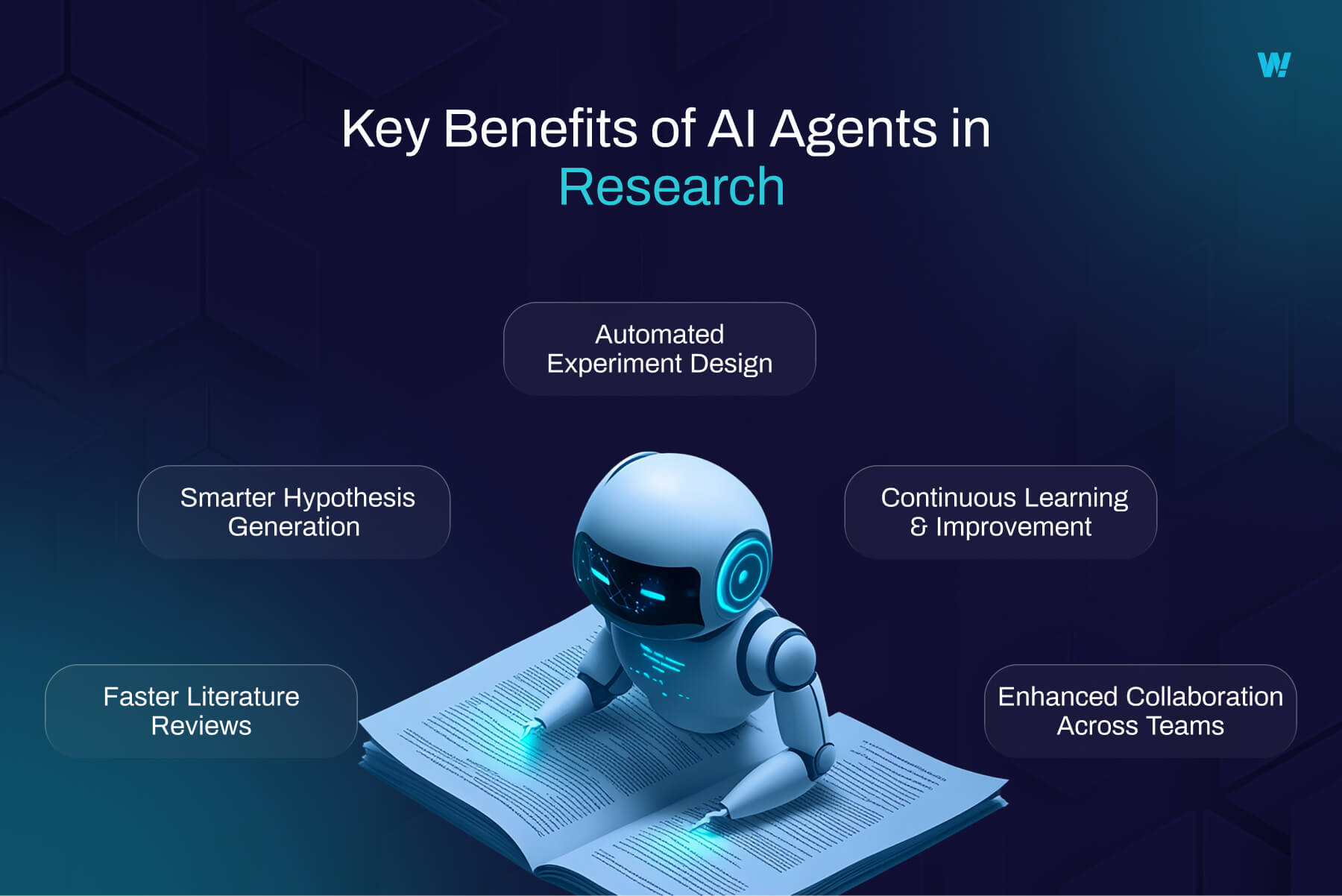
1. Faster Literature Reviews
AI agents rapidly scan thousands of academic papers, extract meaningful insights, and flag knowledge gaps—what used to take researchers weeks can now happen in minutes.
Example: A drug discovery agent analyses over 200 studies and highlights 5 overlooked compounds with high therapeutic potential, speeding up early-stage research dramatically.
2. Smarter Hypothesis Generation
By analysing both structured datasets and unstructured text, AI agents can propose novel, data-driven hypotheses that may be unintuitive to human researchers.
Example: In oncology, an AI agent identifies a potential link between two previously unrelated biological mechanisms, prompting a new direction for cancer treatment research.
3. Automated Experiment Design
AI agents help researchers plan and refine experiments, suggest optimal variables, and simulate potential outcomes—allowing scientists to test ideas virtually before committing lab resources.
Example: In material science, an AI agent designs synthetic polymer combinations and simulates their performance, reducing trial-and-error cycles in the lab.
4. Continuous Learning and Improvement
Unlike static tools, AI agents evolve with every new data input. They adapt their models, update assumptions, and improve strategies over time using reinforcement learning.
Example: When an experiment fails, the agent revises its hypothesis and automatically adjusts experimental parameters to increase the likelihood of success.
5. Enhanced Collaboration Across Teams
AI agents act as a smart connective layer between departments, tools, and data silos—facilitating seamless communication and version control.
Example: A multidisciplinary research team spanning biology and chemistry uses an AI agent to centralize documentation, track results, and align progress in real time.
Use Cases of AI Agents in Research Function
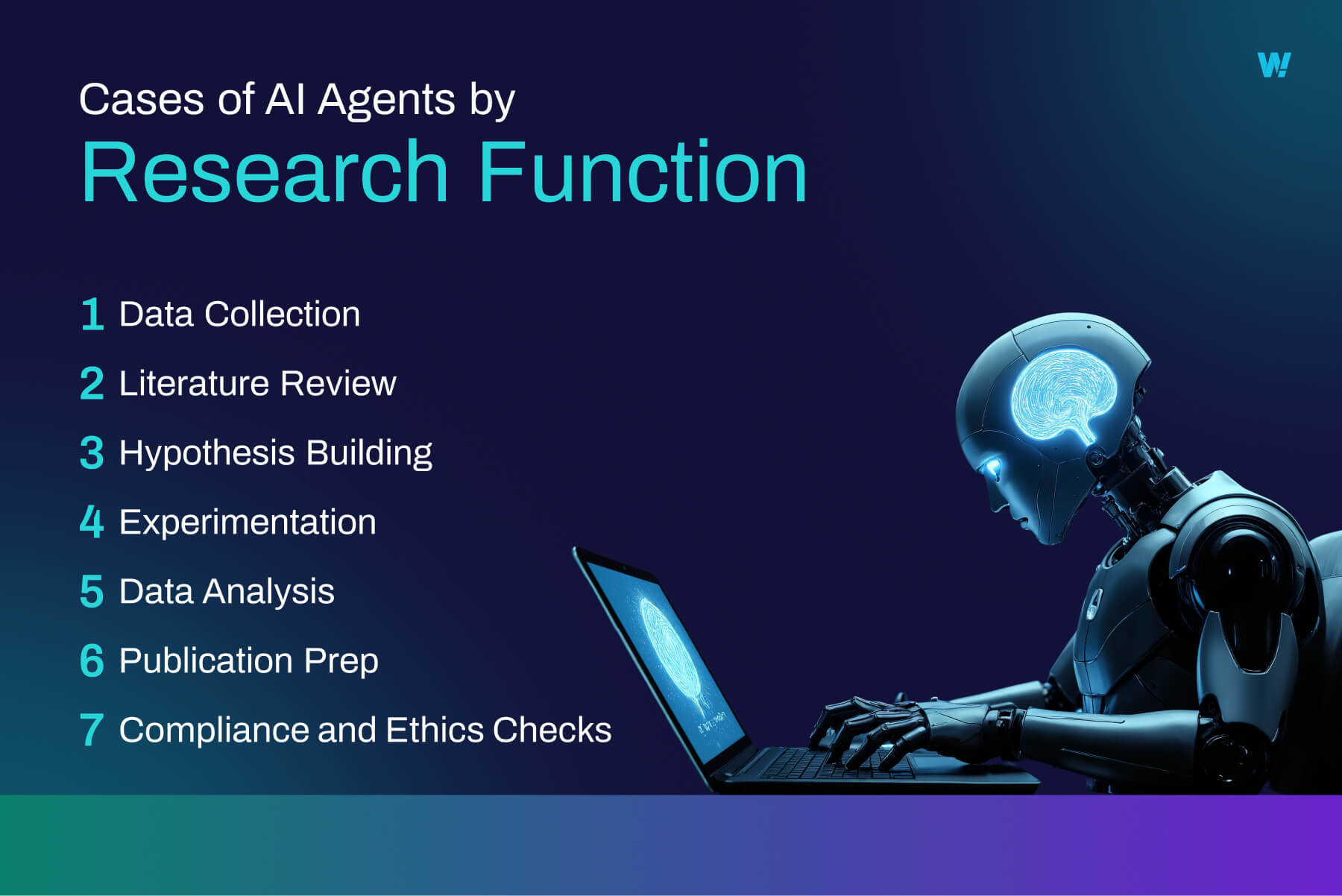
- Data Collection
Automating the extraction of structured insights from unstructured sources
AI agents streamline the laborious task of gathering data from scattered, often unstructured materials such as PDFs, handwritten notes, and scientific journals.
- Automatically extracts relevant tables, figures, and metadata from research papers
- Translates handwritten or scanned documents into machine-readable formats
- Organises and classifies extracted data for downstream analysis or integration into databases
Example: A team in environmental science deployed an AI agent to digitise and index decades of handwritten field logs into a searchable archive.
- Literature Review
Accelerating academic synthesis through intelligent tagging and summarisation
Agents reduce the time and cognitive effort required to perform thorough literature reviews by presenting key insights in a structured manner.
- Automatically summarises large volumes of academic articles
- Tags and clusters studies by topic, methodology, and findings
- Cross-links related references to map the state of existing knowledge
Example: A social science lab used an AI agent to scan and summarise 500+ studies, helping researchers identify thematic trends in public health discourse.
- Hypothesis Generation
Suggesting new research directions using historical knowledge and predictive modelling
Through the analysis of past findings and logical associations, AI agents contribute to the formation of novel hypotheses.
- Identifies gaps in current research using knowledge graphs and citation networks
- Suggests logical extensions to existing hypotheses based on domain-specific models
- Applies generative techniques to simulate potential experimental questions
Example: A life sciences institute utilised an AI agent that connected obscure findings across genetics and neurology to propose a new model of disease progression.
- Experimentation Support
Designing, simulating, and in some cases executing experiments
AI agents can assist both in virtual planning and physical execution, making experimentation more efficient and less prone to human error.
- Recommends optimal experimental parameters based on previous outcomes and simulation data
- Predicts likely results and flags redundant tests
- Interfaces with automated lab equipment to execute predefined workflows
Example: A chemistry lab integrated an agent into its automated bench, allowing it to optimise catalyst selection with minimal manual input.
- Data Analysis
Enhancing insight generation through anomaly detection and pattern recognition
Once experimental data is collected, agents play a crucial role in making sense of it.
- Identifies anomalies, outliers, and inconsistencies in datasets
- Uncovers hidden correlations and statistically significant patterns
- Performs routine analysis tasks such as regression, clustering, and time-series modelling
Example: A clinical research team used an AI agent to analyse trial data and detect unexpected patient response patterns that were missed during manual review.
- Publication Preparation
Streamlining drafting, visualisation, and citation workflows
AI agents reduce the administrative burden of turning research findings into publishable content.
- Drafts preliminary abstracts, introductions, and summaries
- Generates visual assets—charts, diagrams, and figures—from raw data
- Suggests and formats references in alignment with journal requirements
Example: A PhD researcher accelerated their paper submission process by using an agent to convert a dataset into visual charts and produce a first-draft abstract.
- Compliance and Ethics Verification
Embedding responsible research principles through automated checks
To uphold ethical standards and institutional compliance, AI agents assist in pre- and post-publication reviews.
- Reviews research protocols for alignment with ethical guidelines and regulatory standards
- Flags potential use of sensitive or non-consensual data
- Advises on necessary disclosures and safeguards related to participant data or biosamples
Example: An AI agent deployed by a genomics lab flagged gaps in data consent forms before public data release, allowing researchers to resolve issues proactively.
Want to Build an AI Agent for Research?
The future of scientific research lies on intelligent systems that understand the unique demands of your domain. Imagine an AI agent that doesn’t just assist but actively accelerates your research journey.
If you’re in genomics, materials science, social sciences, or beyond, building a bespoke AI agent can transform the way your team works. By aligning the agent’s capabilities with your specific methodologies and datasets, you gain:
-
Greater control over your workflows, ensuring precision and customisation
-
High adaptability, with the ability to evolve with new research inputs
-
Data ownership and privacy, as your models are trained securely on proprietary information
-
Workflow continuity, with agents that integrate seamlessly into existing pipelines
A custom AI agent can support everything from automated literature reviews and hypothesis generation to experiment design, simulations, and multi-team collaboration.
If you’re considering building an AI agent that truly reflects the needs of your research environment, we invite you to explore how this vision becomes reality with Wow Labz.
Let’s collaborate on building an agent that accelerates your discovery process.
How Wow Labz Can Help
At Agentic AI Labz, a specialised division within Wow Labz, we’re pioneering intelligent systems designed for research-intensive domains. Our focus is on building agentic AI that not only automates but intelligently adapts to the evolving needs of modern scientific workflows.
Here’s how we support research teams and institutions:
-
Proven experience in scientific domains,
-
Deep expertise in building autonomous workflows ,
-
End-to-end development
-
Training agents on your proprietary datasets
-
Secure, ethical, and scalable architecture
-
Collaborative development process
Our solutions are designed with precision, built to integrate, and aimed at empowering the next generation of researchers.
Ready to build an AI agent that accelerates your research? Let’s connect.

